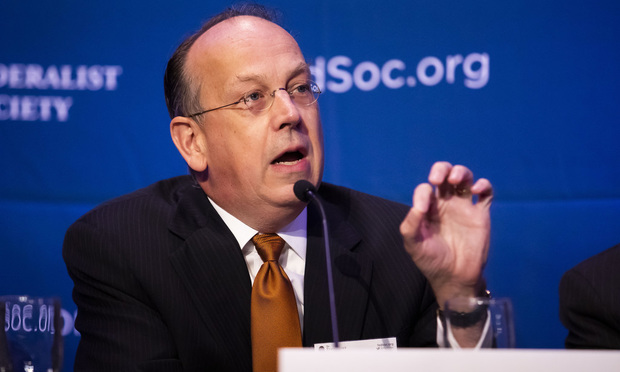 Paul Clement, representing four insurance companies, argued that the appropriation riders did not repeal the program and left intact a "clear and enforceable promise required to make the Affordable Care Act work." (Credit: Diego M. Radzinschi/ ALM)
Paul Clement, representing four insurance companies, argued that the appropriation riders did not repeal the program and left intact a "clear and enforceable promise required to make the Affordable Care Act work." (Credit: Diego M. Radzinschi/ ALM)The U.S. Justice Department on Tuesday faced a skeptical U.S. Supreme Court over arguments that the government had no obligation to pay $12 billion in losses incurred by insurance companies that agreed to participate in a federal program to provide health insurance for high risk individuals through the Affordable Care Act.
The Affordable Care Act established a "risk corridors" program stating that the government "shall pay" insurers a portion of their losses for three years beginning in 2014 if their costs were higher than anticipated. Insurers were obligated to pay a portion of any savings into the program if costs were lower than expected.
But after the insurers had performed in fiscal years 2014, 2015 and 2016, and paid into the program, Congress passed appropriation riders requiring the Department of Health and Human Services to use only funds paid into the program.
Insurers were obligated to pay into the program and the government committed to paying out "if we feel like it," Justice Elena Kagan said in one exchange to Deputy Solicitor General Edwin Kneedler. "What kind of a statute is that?"
In the cases consolidated under Maine Community Health Options v. United States, Kneedler argued repeatedly that the risk corridors program was about subsidies for insurers working in the market, and not a contract with the government. They were not working for the government, he said. "Congress can create incentives to enter a program," and there were a number of other incentives offered, Kneedler told the court.
But Kirkland & Ellis partner Paul Clement, representing four insurance companies, argued that the appropriation riders did not repeal the program and left intact a "clear and enforceable promise required to make the Affordable Care Act work."
Not paying according to the formula in the program, Clement said, was "a massive government bait and switch."
Four insurers filed damages actions in the U.S. Court of Federal Claims under the Tucker Act seeking reimbursement under the statutory formula. Three lost and one prevailed, but the U.S. Court of Appeals for the Federal Circuit subsequently reversed the one victory and affirmed the other losses.
The appellate court said the appropriation riders demonstrated Congress's intent to abrogate its financial obligation. The court said the statute did not contain language necessary to show the government intended to create a contract.
Chief Justice John Roberts Jr. questioned Clement about his clients' reliance on the government's alleged obligation to pay. "But they have good lawyers and I would have thought at some point they would have sat down and said, 'Well, why don't we insist upon an appropriations provision before we put ourselves on the hook for $12 billions?'" he asked.
Clement said insurers in 2010 relied on a "money-mandated promise." He told Roberts: "It is not the law that the government can make an obligation go away." The remedy for the insurers, he said, was to file suit in the Federal Claims court, "get a judgment, and get damages from the government's Judgment Fund."
Kneedler faced many more skeptical questions than Clement. Justice Stephen Breyer repeatedly and with hypotheticals pressed the veteran Justice Department lawyer on why the "shall pay" language did not create an enforceable contract.
"Why doesn't the government have to pay its contracts like everyone else?" Breyer asked. "They didn't say they wouldn't pay, just don't pay out of that fund."
Kneedler replied, "This isn't a contract." Breyer pressed again, "Why not? Why isn't it close enough?"
Kneedler argued that absent a clear statement that a contract was being formed, the statute does not state a contract. "It states a policy," he said.
Besides Maine Community Health, other insurers involved in the Supreme Court case are Moda Health Plan, Blue Cross and Blue Shield of North Carolina and Land of Lincoln Mutual Health Insurance.
The risk corridors case is the fifth Affordable Care Act case to be heard by the justices since the Obama-era law's enactment in 2010. They may soon face a sixth dispute: a ruling is expected shortly by the Fifth Circuit on a group of Republican-led states' challenge to the entire law. The court is weighing a Texas trial judge's declaration that the entire law must fall.
Read more:
- DOJ urges Supreme Court to reject health insurers' $12B risk-corridor payment challenge
- Appeals court ruling costs health insurers billions in subsidies
- The Trump Administration, consumer directed health plans and the future
© 2025 ALM Global, LLC, All Rights Reserved. Request academic re-use from www.copyright.com. All other uses, submit a request to asset-and-logo-licensing@alm.com. For more information visit Asset & Logo Licensing.







